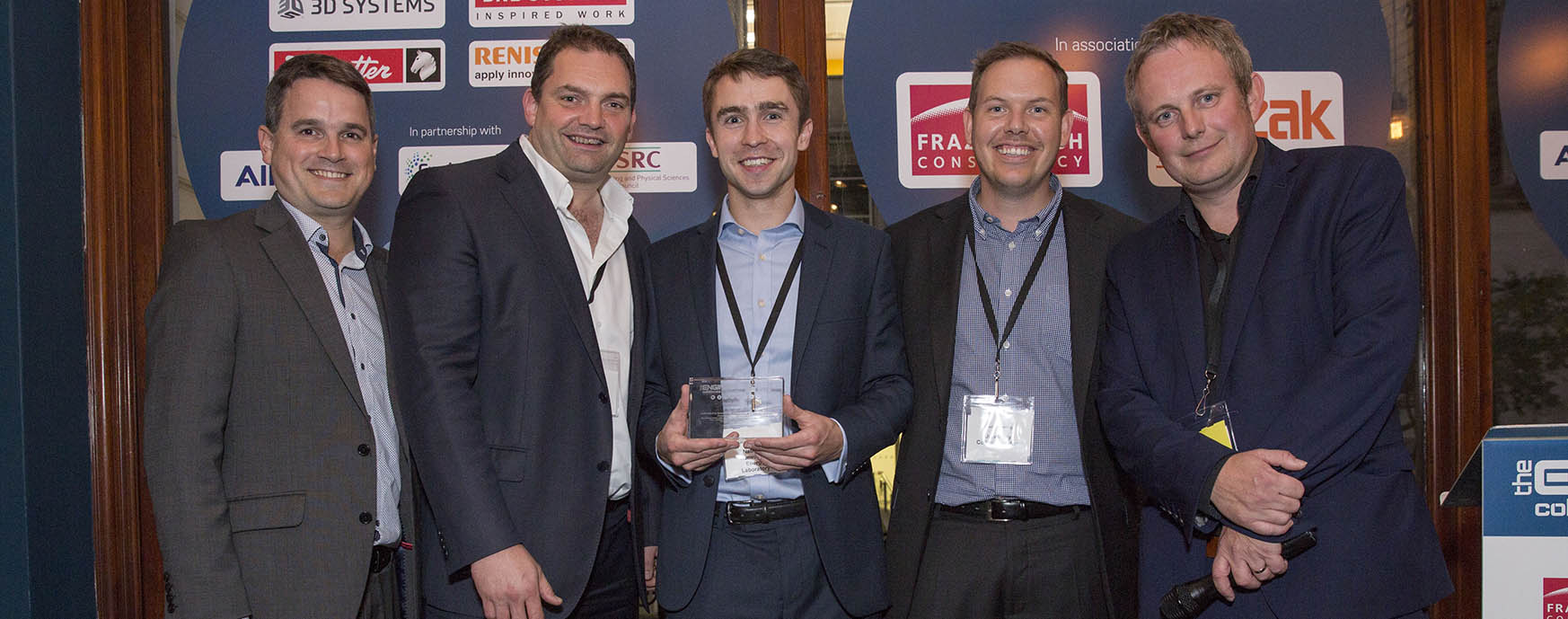NREL Wins Prestigious UK "Academy Award" for Engineering

NREL's Donal Finegan (center) holds the Engineer Collaborate to Innovate Safety and Security Award while surrounded by Professor Dan Brett (UCL) on his immediate left, Paul Shearing (UCL) on his immediate right, and two awards presenters. Photo courtesy of Engineer Collaborate to Innovate Award staff
Some industry awards are so well-known to the public that they have become household names: the Oscar, the Michelin Star, the Heisman Trophy, and the Grammy. In the U.S. engineering world, R&D 100 Awards are the equivalent of Oscars, and the Engineer Collaborate to Innovate Award is the United Kingdom's (UK's) version on the other side of the pond. In September, NREL and partners from University College London (UCL), along with NASA, The European Synchrotron, and the UK National Physical Laboratory, got their turn on the red carpet, winning an Engineer Collaborate to Innovate Award for lithium-ion (Li-ion) battery safety research using NREL's patented, R&D Award-winning Battery Internal Short Circuit (ISC) Device.
"In our world, this really is a sweep of the awards," says NREL Team Lead and Vehicle Electrification Group Manager Matt Keyser. "We're humbled to find ourselves in such impressive company."
UCL, NREL, NASA, and their partners were recognized in the category of Safety and Security. To put the significance of this into perspective, last year's winner in the same category won for the design and manufacture of two 65,000-ton aircraft carriers—the largest warships ever built in the UK.
Small and lightweight Li-ion batteries are the energy storage solution of choice for electric-drive vehicles (EDVs), consumer electronics, and more. Recent high-profile incidents, including the recall of Samsung's Galaxy Note 7 smartphone and the grounding of the Boeing Dreamliner aircraft fleet, highlight why innovations in battery safety are essential.
The winning UCL-led team used the Battery ISC Device developed by NREL and NASA to study failure mechanisms in Li-ion batteries and then recorded their experiments using ultra-high-speed X-ray imaging. By tracking what happened to the temperature and structure of cells as an internal short circuit progresses within a battery, they highlighted the importance of safety devices in mitigating consequences of catastrophic failure, as well as how susceptible neighboring cells could be to the propagation of thermal runaway, which can spread in the blink of an eye.
"In our world, this really is a sweep of the awards. We're humbled to find ourselves in such impressive company."
The investigations by NREL, UCL, NASA, and their partners validate the importance of isolating failing cells within larger battery packs and modules, giving insights into how safety mechanisms affect abuse tolerance and which design options might be capable of minimizing the potential for cell-to-cell propagation. This fundamental knowledge is critical to the safety of drivers as EDVs gain ground in the marketplace, astronauts as advancements are made in space travel, and consumers as they are faced with ever-increasing choices in home electronics.
NREL Postdoctoral Researcher Donal Finegan led the collaborative effort over the past three years and was present to accept the award on behalf of the NREL team. Finegan started at NREL in April 2017 after completing his Ph.D. working with Paul Shearing (pictured above) at UCL. The award-wining innovations will be showcased at a conference on Dec. 7.
NREL's Energy Storage innovations accelerate development of high-performance, cost-effective, and safe energy storage systems to power the next generation of EDVs. While hybrid electric vehicles, plug-in hybrids, and all-electric vehicles promise to curb greenhouse gas emissions and slash America's need for imported oil, battery price and performance can present considerable challenges. As the country's recognized leader in battery thermal management research and development (R&D), NREL conducts testing, modeling, simulation, and system evaluation activities to assess energy storage components at the materials, cell, pack, and systems levels to help address these issues and put new EDVs on the road.
Last Updated Jan. 22, 2026
